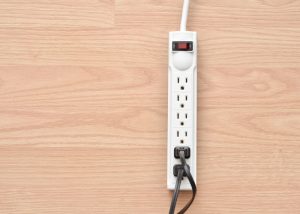 Homes today have more electrical equipment and appliances in them than ever before. In fact, if we had to guess we’d say that you likely have multiple devices connected to your power supply/electrical grid at any given time, right? What’s the best way to protect your appliances and power charging stations, though?
Homes today have more electrical equipment and appliances in them than ever before. In fact, if we had to guess we’d say that you likely have multiple devices connected to your power supply/electrical grid at any given time, right? What’s the best way to protect your appliances and power charging stations, though?
It’s important to know the answer to this since power surges—also known as voltage spikes—can do irreparable damage to electrical components. Think you can avoid worrying since you have power strips in all your outlets? We have some news…
You’re not really protected. It’s time to call your trusted Waterloo electricians and see what more you could be doing to protect your home’s electrical system and the appliances connected to it. Read on as we elaborate!
What Does a Power Surge Mean?
A power surge or voltage spike occurs when there is a sudden increase in voltage throughout your electrical system. This surge is capable of melting wires and causing fuses to blow, or circuit breakers to trip (if you still have a fuse box, it’s time to upgrade to an electrical panel! But that’s a blog post for another day).
Homeowners often think that this is caused by lightning strikes. While stormy weather certainly does contribute to power surges, there are other sources—sources you should be more concerned with.
The thing is, most power surges come from inside your home. We’re not just saying that to be dramatic, though it does sound like a good intro to a horror movie, right? The fact is, when a powerful electrical appliance turns on—like your air conditioner, for instance—it can cause an imbalance in the electrical current, creating a power surge. Have you ever noticed the lights in your home suddenly flicker when your refrigerator runs? This is an example of a power surge.
Why Power Strips Aren’t Enough
Power strips are certainly a step in the right direction toward protecting your home and appliances from power surges, and they’re a safer alternative to older “octopus” plugs used to allow for more appliances to plug into a single outlet. Power strips contain their own circuit breaker, so if there is a voltage spike, the strip will shut off power to prevent damage to appliances plugged into it.
We absolutely recommend you use power strips for small-scale electronics—to charge your phone, laptop, e-reader, etc. However, power strips are only one line of defense, and may not be enough for large power surges. A massive spike in your home’s voltage can overcome a power strip, and some lesser surges won’t cause power strips to activate, but could still hurt your electronics that are plugged in.
The best form of protection against power surges is whole house surge protection. Our professional electricians can install this right into the electrical panel of your home, which is where the electricity from your power grid enters the home and divides into individual circuits.
A whole-house surge protector sends any excess voltage down into the ground, rather than into the electrical system, preventing the surge from reaching the rest of your home. Whole house surge protection can handle the most extreme surges from storms or even power plant issues.
At Dalton Plumbing, Heating, Cooling, Electric and Fireplaces, Inc., your comfort is our promise! To set up an appointment, and protect your home, give us a call at the number above, email customerservice@daltonphc.com or schedule an appointment online.
